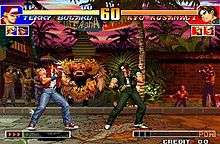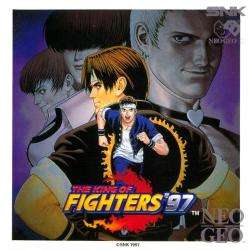The King of Fighters '97
| The King of Fighters '97 | |
|---|---|
|
Neo-Geo CD cover for The King of Fighters '97, displaying new characters Shingo Yabuki (forefront), Yashiro Nanakase, Shermie and Chris (background, from right to left). | |
| Developer(s) | SNK |
| Publisher(s) | SNK |
| Director(s) | Toyohisa Tanabe |
| Producer(s) | Takashi Nishiyama |
| Series | The King of Fighters |
| Platform(s) | Arcade, Neo-Geo, Neo-Geo CD, Sega Saturn, PlayStation, PlayStation 2, PlayStation Network, Virtual Console, iOS, Android |
| Release |
Arcade
Neo Geo
Neo-Geo CD
Sega Saturn
PlayStation
PlayStation Network
Wii Virtual Console iOS, Android
|
| Genre(s) | Fighting |
| Mode(s) | Up to 2 players simultaneously |
| Cabinet | Upright |
| Arcade system | Neo Geo |
The King of Fighters '97 is a 1997 fighting game produced by SNK for the Neo Geo arcade and home console. It is the fourth game in The King of Fighters series. It was ported to the Neo-Geo CD, as well as the PlayStation and the Sega Saturn in Japan only. The Saturn requires the same 1MB RAM cartridge utilized by the previous game.
Gameplay

KOF '97 follows the same format as the previous KOF games, but introduces two distinct playing styles which the player can select before choosing their team: Advanced and Extra.
Advanced mode is based on the previous game in the series, KOF '96, but features a revamped Power Gauge. Instead of charging the Power Gauge, the Power Gauge is now filled whenever the player strikes the opponent or by performing Special Moves. The player can stock up to three Power Gauges. The player can use one stock of the Power Gauge to perform a Super Special Move or enter a "MAX" mode, in which the player's defensive and offensive strength are increased. Performing a Super Special Move while in MAX mode will make the player perform a more powerful Super Special Move.
Extra mode is based on the first two games in the series, KOF '94 and KOF '95. Like in those games, the player fills the Power Gauge by charging it or defending against the opponent's attacks. After the gauge is filled, the player enters MAX mode and like in Advanced, their character's offense and defense will increase. The player can only perform Super Special Moves in MAX mode or when the life gauge is near empty and flashing red. When the player performs a Super move in MAX mode while the life gauge is flashing red, then the Super move will be even more powerful. The Emergency Roll maneuver from KOF '96 used in Advanced mode is replaced by the side-step from KOF '94 and KOF '95.
Plot and characters
Despite the events at the end of the previous game, the KOF tournament was a huge commercial success and sparked a worldwide fighting craze. Within a few months of the tournament ending, various large corporations had held smaller KOF tournament qualifiers and constructed special KOF stadiums around the world, building the excitement up for the next tournament. News of the tournament spread through every form of media and fans and new fighters from across the globe come to watch the preliminary matches.
All of the characters from the previous game return, with the exception of the Boss Team (which was disbanded after its first appearance), Kasumi Todoh (who went off to search for her father), and Mature and Vice (who were killed by Iori Yagami after he was possessed by the Riot of Blood at the conclusion of the previous game).
Chizuru Kagura, the sub-boss in the previous game, takes Kasumi's place in the Women Fighters Team, while Geese Howard's underling Billy Kane, who previously participated in The King of Fighters '95 tournament, returns to join forces with female agent Blue Mary and wanted felon Ryuji Yamazaki (both from Fatal Fury 3) to form the unlikely "'97 Special Team". Iori returns as a Team Edit character along with Shingo Yabuki, a high school student who patterns his fighting style after his idol and reluctant mentor Kyo Kusanagi. An alternative version of Kyo with his pre-KOF '96 moveset also appears as a hidden character.
Iori and Leona will fight as mid-boss characters in the Riot of the Blood curse depending of which characters the player is using. A team of all new characters also appears in the form of the "New Faces Team", consisting of bandmates Yashiro Nanakase, Shermie, and Chris. The New Face Team will be revealed to be the last three servants from Orochi during the Arcade Mode. Additionally, they fight as sub-boss characters having enhanced abilities than their common forms. Once they are beaten, Orochi will possess Chris's body to fight as the final boss character.
Development
In order to decide who would become the members of the '97 Special Team, three polls were conducted by the video game journals Weekly Famitsu, Gamest and Neo Geo Freak, in which readers voted who was the character they wanted to see in the team. The Neo Geo Freak's winner was Billy Kane and Famitsu's winner was Ryuji Yamazaki. Blue Mary was first in the Gamest poll, winning to Duck King from the Fatal Fury series who was second. Additionally, the three journals created a team, which players can view an image of them after beating the game in the Japanese version. The special team created by the Neo Geo Freak's staff was a team of fire wielders: Billy, Kyo Kusanagi, and Mai Shiranui. The Gamest's team created was composed of Terry Bogard, Blue Mary and Joe Higashi, while Famitsu created a team composed of Chang Koehan, Choi Bounge and Ryuji Yamazaki.[1] Although Blue Mary already had two designs in the Fatal Fury series at this point (her original Fatal Fury 3 design and her Real Bout Special design), her designer wanted to use her Fatal Fury 3 design as he liked it more.[2] In order to have all of the eight servants from Orochi confirmed by this game, Yamazaki was chosen to be the new member as the staff noted him to be a good villain and liked that he was similar to a snake (as the ancient Orochi was a giant snake). In order to adapt him to KOF, the game planner had to provide new moves to Yamazaki. The new moves were initially noted to be failures, but designers later thought of them as successful.[3]
The New Faces Team was created to offset the remaining top three characters. Their members were developed to be the Hero Team's counterparts; Chris manipulates fire like Kyo, Shermie uses lightning like Benimaru Nikaido and Yashiro Nanakase is a giant man like Goro Daimon.[4] The plot element of Chris acting as Orochi's new body was developed since initial stages of production, but the staff had already thought of using other ideas.[5] At the inception of production, the plan was for Chris to use the "Flame of Darkness (Black Flame)," but due to difficulties of seeing the black flame in the screen it was changed to the purple ones.[6] The final boss character, Orochi, was first meant to be "a buck-naked Chris" fighting with a shining energy ball. However, it was opted to his current design after developers made a survey in which there were only two votes in favor of the first design. His design codename was "Chief", but several people were against of giving him the name of "Orochi".[7]
Iori Yagami in his Orochi form was originally meant to be the final boss of the game after the player beats the New Faces Team in their Orochi forms. However, it was later decided to make Orochi Iori the mid-boss with Orochi becoming the final boss and the New Faces Team as the sub-bosses.[8] Series' flagship director, Toyohisa Tanabe, states that the staff was initially reluctant to add this version of Iori to the series' roster — worried about fans' reactions — but did so to add more impact to the Orochi Saga's climax. He was particularly pleased to see surprised reactions from female fans to this form during KOF '97's location testing.[9] After deciding Iori as the mid-boss character, developers also were focused in adding Leona as an alternative mid-boss character if players were already using Iori in the game. As such, several advertisements were added such as televisions broadcasts, sent to be given as a message to the player about a "fork in the game" to give hints about Orochi Leona.[10]
In The King of Fighters '96, several moves from Kyo were changed in order to adapt him to the new game system. However, the original moveset was still popular between gamers and as such, an alternative version from Kyo was added to KOF '97.[11] The introduction of this version was noted to be "a hit" within gamers, the staff kept adding new alternative versions of other characters to the sequels. This later led to the creation of the Kyo clones (Kyo-1 and Kyo-2) from The King of Fighters '99.[12]
Release
The King of Fighters '97 was first released in Japanese arcades on July 28, 1997. It was ported to the Neo Geo and Neo-Geo CD on September 25, 1997 and October 30, 1997, respectively. A PlayStation version was also released on May 28, 1998. The Sega Saturn version was published on March 26, 1998 and it requires the same 1MB RAM cartridge utilized by the previous game. A "Saturn Best Collection" was released on October 1, 1998, adding a new cover and a lower price.[13] It was also compiled in The King of Fighters Collection: The Orochi Saga in 2008 for the PlayStation 2, PlayStation Portable and Wii.[14] During its release week, the Sega Saturn port of the game sold 94,327 copies in Japan. As of 2004, the sales went to 156,717.[15]
References
- ↑ All About SNK Head-to-Head Fighting Game 1991–2000 (in Japanese). Denpa Shinbunsha. 2000. ISBN 978-4-88554-677-8.
- ↑ "Blue Mary official profile". King of Fighters 10th Anniversary Official Website. Retrieved 2009-03-11.
- ↑ "Ryuji Yamazaki official profile". King of Fighters 10th Anniversary Official Website. Retrieved 2009-03-14.
- ↑ "Yashiro Nanakase official profile". King of Fighters 10th Anniversary Official Website. Retrieved 2009-03-14.
- ↑ "Chris official profile". King of Fighters 10th Anniversary Official Website. Retrieved 2009-03-14.
- ↑ "Orochi Chris official profile". King of Fighters 10th Anniversary Official Website. Retrieved 2009-03-14.
- ↑ "Orochi official profile". King of Fighters 10th Anniversary Official Website. Retrieved 2009-03-14.
- ↑ "Orochi Iori Yagami official profile". King of Fighters 10th Anniversary Official Website. Retrieved 2009-03-14.
- ↑ Akihiko Ureshino, ed. (2005). The King of Fighters Perfect Reader (in Japanese). Nikkei Business Publications, Inc. p. 144. ISBN 4-8222-1711-6.
- ↑ "Orochi Leona official profile". King of Fighters 10th Anniversary Official Website. Retrieved 2009-03-14.
- ↑ "94 Kyo official profile". King of Fighters 10th Anniversary Official Website. Retrieved 2009-03-14.
- ↑ "95 Kyo official profile". King of Fighters 10th Anniversary Official Website. Retrieved 2009-03-14.
- ↑ "The King of Fighters '97 official profile". King of Fighters 10th Anniversary Official Website. Retrieved 2009-03-14.
- ↑ "KoF Collection Orochi Releases dates". Game Spot. Retrieved 2008-09-21.
- ↑ "Sega Saturn Japanese Ranking". Japan Game Charts. Archived from the original on July 14, 2009. Retrieved July 14, 2009.
External links
- The King of Fighters '97 at the official Japanese website of SNK Playmore
- The King of Fighters '97 at MobyGames
- KOF'97 combos
